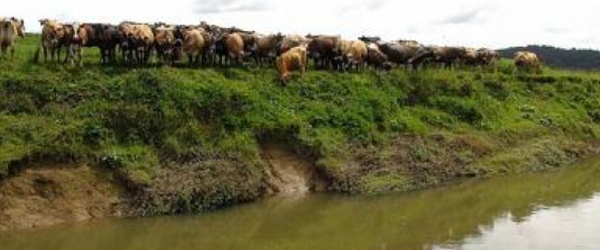
Is water quality important?
August 28th, 2016This week is a celebration of the big H2O, and rightly so!
Water is one thing that the human body needs to survive; in fact, your body is composed of approximately 60 per cent water, which serves all sorts of purposes, from regulating your temperature to protecting your spinal cord, joints and muscle tissue. If this is not a good enough reason to make sure that you are hydrating every day, how about you do it to feel energised and keep your skin looking radiant, because water helps with that too.
I cannot think of a reason to not drink plenty of mother nature’s nectar. Oh wait, actually there may be one reason… POLLUTION!
Now you may be thinking – but we live in New Zealand and it is so clean and green. Yes, you are right, but what is living on that greenness? Stock! Cattle, dairy cows and sheep, to name but a few, and what do all of these animals have in common? They all eat, drink pee and poo. Where does this pee and poo go? Into our waterways. Now, I don’t know about you, but the thought of drinking water (even if it has been filtered) .
The problems do not just affect us. Remember that there are a lot of wild, wacky and astounding creatures and critters that we share our world with who also rely on clean water to survive and flourish. A lot of these species inhabit estuaries, also known as ‘nurseries of the sea’, which is where the fresh water from streams and rivers meet the ocean. Our aquatic friends feed, reproduce and often live out the start their lives in these areas, which make estuaries a crucial part of our eco-system.
Unfortunately, due to intensive farming practises, our estuaries are being filled with animal effluent and it is killing our wildlife, the land and ultimately the eco-system. What was once an exuberant breeding ground for vital inhabitants now becomes a dead zone, void of oxygen, activity and life.
Over the space of four years (2008-2012) there were over 150 prosecutions and 300 charges of unlawful pollution caused by dairy effluent in New Zealand. The court fines collected for this period added up to a whopping 3.2 million dollars. It is estimated that it would cost 15 billion dollars to clean up all dairy-related pollution in New Zealand.
Now that I have covered the effect of animal excrement in our waterways, what about water usage? The farming sector requires a vast amount of water. This water is usually obtained from underground aquifers or, from local rivers and streams. It is then used to irrigate the land to keep the grass growing to feed stock.
A recent study conducted by The Cawthron Institute found that New Zealand river flow levels are almost twice as low as they should be.
This is due to too much water being syphoned off for farm irrigation. To really put this water usage into perspective, the Water Footprint Network estimates that it takes about 250 litres of water to produce one glass of milk – or 1000 litres of water to make 1 litre of milk!
Every individual human also contributes to water usage and pollution in some way. The good news is there are multiple ways to minimise your ecological footprint, and luckily for you I know some excellent ways to do this. You could cut back your meat and dairy consumption which not only reduces water usage and pollution, but it also makes a difference to the lives of the animals that are farmed. I am sure that they will thank you for it and so will your body, when you fill it instead with fresh fruits and vegetables.
If your car needs a wash, be smart about it – do not just leave the hose running when you are not using it, and avoid harsh cleaning products that are full of chemicals, as these will end up in our waterways.
Remember, the products you use in the shower or bath, sink and laundry all go down the drain. These will eventually end up in a water way, so when you are making purchasing decisions, make sure that you choose brands that are ‘eco-friendly’ like Ecostore and Earthwise.
If you would like more information on how you can combat climate change with a diet change, head along to the Go Veg part of our website where you will find heaps of helpful information and delicious recipes.
Happy World Water Week!
Krysta – Campaigns Assistant (Go Veg)
